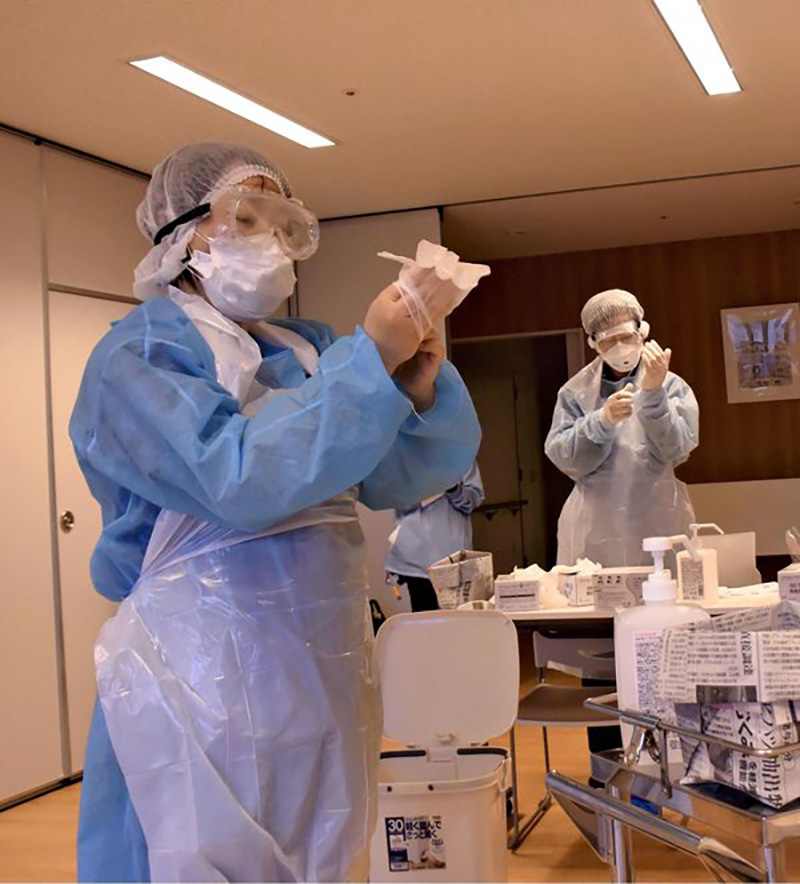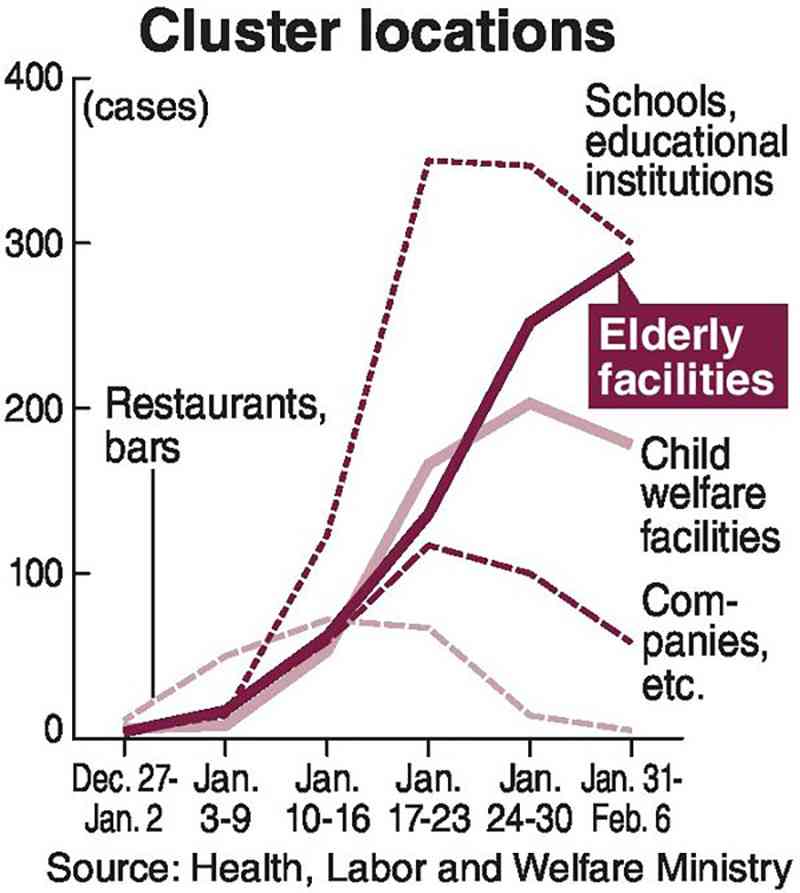
Staff members undergo training at an elderly care home in Musashino, Tokyo, on Feb. 10.
13:55 JST, February 17, 2022
The pace of new coronavirus cases is slowing down nationwide, but infections at elderly care facilities have continued to increase and there has also been a sharp rise in the number of cluster outbreaks.
Some people who have tested positive for coronavirus at such facilities have been forced to recuperate at their facilities because of a hospital bed shortage. But a lack of support and experience implementing virus measures is piling pressure on such facilities.
Staff members test positive
“It’s unbelievable that elderly people can’t be hospitalized. What would happen if their condition suddenly deteriorated?” said the manager of an elderly care home in Tokyo.
A cluster outbreak emerged in late January, with eight residents in their 60s to 90s subsequently testing positive for coronavirus. Only three of the patients were able to be hospitalized. The others had to recuperate at the facility, which was split into zones to separate coronavirus patients from the other residents.
Infections also spread among the facility’s team members, who have become mentally and physically overwhelmed due to the pressure of the situation, the manager of the facility said.
According to data compiled by the Health, Labor and Welfare Ministry, 292 clusters (five or more cases detected at one location) were detected at elderly care facilities in the week ending Feb. 6, about seven times more than the peak of 43 cases recorded during the fifth wave of infections last summer, and the figure is still rising.
According to a survey conducted in early February by the Osaka prefectural government, about 80% of residents of elderly care facilities who tested positive for coronavirus were recuperating at their facilities.
The highly contagious omicron variant has made it difficult to contain outbreaks when clusters emerge at such facilities. An official at a facility in Kanagawa Prefecture where more than 50 residents tested positive said, “Even with zoning, people with dementia were moving around the facility. Infections spread so fast.”

At a facility in Okinawa Prefecture, infections spread among almost all the residents and more than half of the staff, leading to a situation in which staff members who tested positive took care of infected residents.
As cluster cases at elderly care facilities have increased, the availability of COVID-19 beds at medical institutions has decreased.
At Nihon University Itabashi Hospital in Itabashi Ward, Tokyo, the 56 beds secured for patients with severe or moderate symptoms are almost all occupied, with about 70% of them being used by elderly patients.
Although the omicron strain is said to be less likely to cause serious illness, there have been many cases of elderly coronavirus patients with chronic health problems such as diabetes that have worsened as a result of the infection.
“Young patients are discharged in about five days or so but with elderly patients, it often takes 10 to 14 days,” said Tadateru Takayama of the university hospital.
Such circumstances have led to a shortage of available beds.
Training needed
Some elderly care facilities have started training staff so they can treat patients who cannot be hospitalized.
On Feb. 10, nurses with expertise in pandemic protocols taught staff members of an elderly care facility in Musashino, Tokyo, how to wear protective gear while observing infection safety measures.
If a resident becomes infected and needs to receive medical treatment, the facility has a plan in place to temporarily close an area for daytime care services, and convert it into a recuperation space for up to 10 patients. It has also reached an agreement with another facility, which will accept users of the day service.
“We want elderly patients at risk of developing serious symptoms to be admitted to hospital, but we are prepared if they need to recuperate at this facility,” a nurse at the Toraifu Musashino care facility said.
In many cases, staff members at nursing care facilities have not received sufficient training on pandemic countermeasures. At the request of the central government, prefectures have set up a team of experts to provide guidance and other support, but many facilities have not yet received such support.
Infection control expert Prof. Erisa Sugawara of Tokyo Healthcare University said, “Municipalities need to urgently establish measures such as creating a way to connect facilities in need of support with experts in local communities.”
Top Articles in Society
-

Man Infected with Measles Reportedly Dined at Restaurant in Tokyo Station
-

Man Infected with Measles May Have Come in Contact with Many People in Tokyo, Went to Store, Restaurant Around When Symptoms Emerged
-

Woman with Measles Visited Hospital in Tokyo Multiple Times Before Being Diagnosed with Disease
-

Australian Woman Dies After Mishap on Ski Lift in Nagano Prefecture
-

Foreign Snowboarder in Serious Condition After Hanging in Midair from Chairlift in Nagano Prefecture
JN ACCESS RANKING
-

Japan PM Takaichi’s Cabinet Resigns en Masse
-

Japan Institute to Use Domestic Commercial Optical Lattice Clock to Set Japan Standard Time
-

Israeli Ambassador to Japan Speaks about Japan’s Role in the Reconstruction of Gaza
-

Man Infected with Measles Reportedly Dined at Restaurant in Tokyo Station
-

Videos Plagiarized, Reposted with False Subtitles Claiming ‘Ryukyu Belongs to China’; Anti-China False Information Also Posted in Japan





















